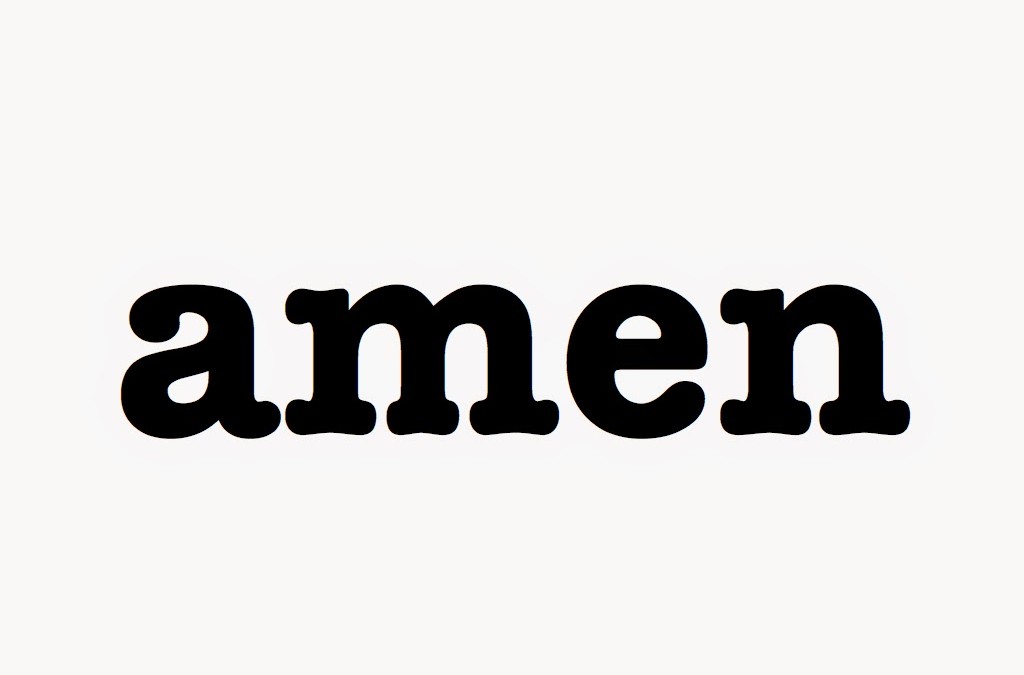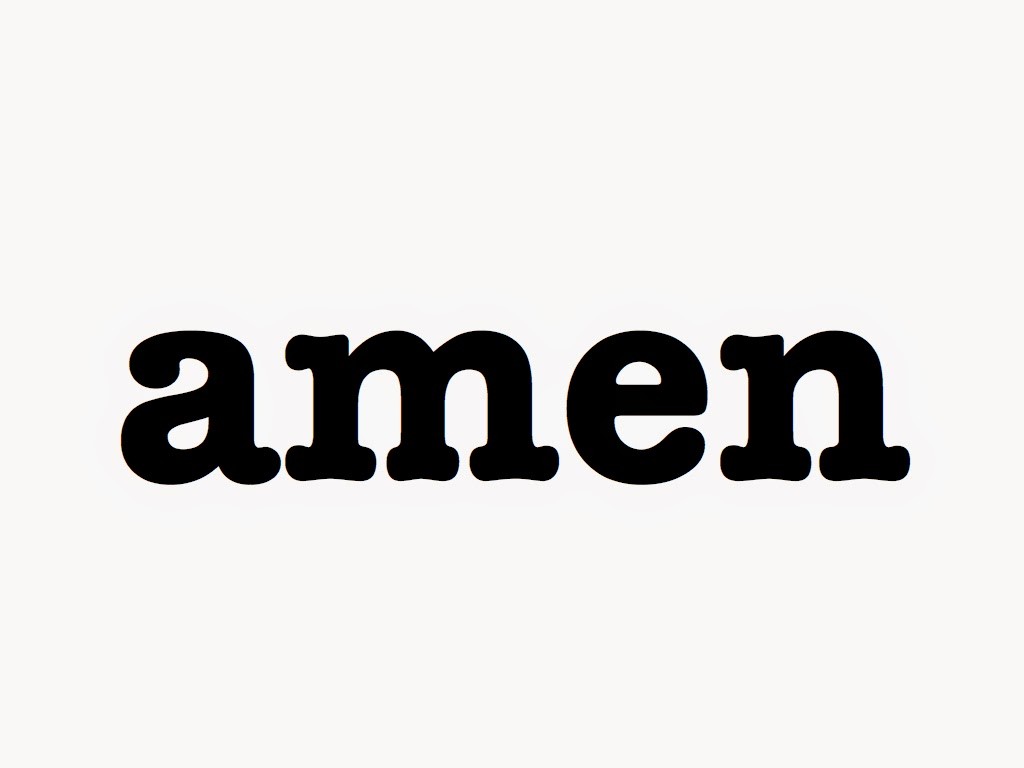We’ve been talking about 3 words that either lead us to pray or are used when we communicate with God in prayer. Just when we thought we were done, we thought there might be a little more to say about this. First, a recap…
We started with the word HELP. It’s the word that forces
us to start up a conversation with God. Why? Because we need HIM.
We moved on to prayer as gratefulness. Ultimately, we
are thankful to God for everything. He’s our provider, our Father, our saviour,
our…everything.
Lastly, we reminded ourselves of a God who WOW’s us, who blows our mind, who gets our attention…in Creation, in relationships, when we’re outdoors or at our kitchen table.
There is one more word that seems to get little attention. The word is AMEN. We kind of rush through the word quickly hoping to get to our next task or conversation.
Anne Lamott says something profound about this, “Amen is only as good as the
attitude in which it’s said. If you are trying to finish up quickly so you can
check your cell phone messages, you are missing the chance to spend quiet
moments with the giver of life.”
So before we close the book on prayer (for these posts) let’s see…was there something else to say?
One concern we may have about prayer is that it can become selfish. We ask God for help because we need help, we thank God because he’s been good, we’re wow’d by God for what he does.
If prayer is a conversation, then we need to leave some space for God to speak to us, to challenge us, to encourage, yes, but also to inspire us towards better things. This is especially true when we talk about the word HELP. When we pray for help in personal matters; things like finances or health or relationships, often we wait for God to act. However, when we pray for God to help others, for God to mend brokenness, for God to bring peace, could it be that he in turn invites us to partner with him in the answers to our prayer?
Shane Claibourn writes, “Prayer is important, but just as important is the call to become the answer to our prayers.”
In John 4 we read some profound words about receiving and giving ‘love’. As you read these words, insert the word ‘help’ where the word ‘love’ is and see what happens…“Since God loved (helped) us so much, we also ought to love (help) one another. No one has ever seen God, if we love (help) one another, God lives in us.”
When God helps us, we should be inclined to, compelled to, inspired to, help others. Just as we receive love and then share it, the same is true for help. Actually, one is very much connected to the other.
The same can be said for ‘thanks’. If we’ve arrived to a posture of gratefulness, in light of all that God does, our reaction or response to it should always be action. (Colossians 3:17)
Anne Lamott says, “Gratitude begins in our hearts and then dove tails into behaviour.
It almost always makes you willing to be of service.” “Saying & praying ‘thank you’ leads to
a crazy thought: what more can I do?”
In John 4, Jesus is in conversation with a Samaritan women. This is already a big deal, because Jewish men (1st century) don’t talk to Samaritan women in public. In this exchange about water, Jesus says that he can give this woman water that will quench all thirst…the deep thirst inside her soul. He also says that if we receive this water, it doesn’t just come into us, but it flows out of us. What we receive from God’s well is what we also give. One sip of Jesus’ living water, and one becomes almost
immediately a gushing fountain of living water for others. (Pete Scazzero)
As we talk about prayer, or even better, as we pray, be thoughtful and aware of what God might be telling you, not just what you’re asking of him. Don’t just pray for your self, pray for others, and as we do that, listen to what God might be saying to you about being the very help that you are asking for. How will our neighbourhoods, cities, world, see God’s love and help? By you and me partnering with God to make his love evident. Mark Buchanan says, “How does the world know
God’s name, nature, mercy, justice? They see it through you and me or not at
all.”
The 3 words remain the same: HELP, THANKS, WOW, but when
we say AMEN, let those words come alive in your life…so after we spend time
with Jesus, we can begin to look like him too!
– – – – – – – – – – – – – – – – – – – – – – –
small(er) group questions:
What compels or draws you to pray more? When things are going well or when things go bad? In other words, do you go to God more for help or to say thanks?
Prayer seems to be understood as a good thing to do if we want to develop a relationship with God and understand his ways. BUT…what is it about prayer that makes it hard to be consistent with it?
We said many times over the last few weeks that prayer is inviting God’s voice to be the loudest & clearest in our lives. What does that mean to you?
Jesus not only prayed, but he taught us to pray a certain way (Matthew 6). Quickly read the Lord’s Prayer in Matthew 6:9-13. What can you learn from Jesus’ instruction? Can you identify our January series words (Help, Thanks, Wow) in the prayer?
If we only ask God for help in personal matters, prayer can be seen as selfish. How has or how does God turn to us with an invitation to become some of the answers to our own prayers? Here’s something from 1 John 4 that might help, “Since God loved (helped) us so much, we also ought to love (help) one another. No one has ever seen God, if we love (help) one another, God lives in us.”
Tonight is a perfect night to pray for each other (as is every small group). As you share personal needs, make sure to add a need that reflects issues of injustice, evil and brokenness in our our world.
(think about coming back next week with some idea’s to bring your prayers to ‘life’)


